Stay in the know on all smart updates of your favorite topics.
3 jarig jubileum Upcyclecentrum- Meld je aan voor ons Digitale Expeditie
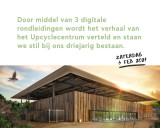
Hoera, het Upcyclecentrum bestaat 3 jaar. Al drie jaar lang laat
het Upcyclecentrum samen met haar ondernemers zien en beleven dat afval niet
bestaat, maar dat afval een grondstof is voor nieuwe producten. Nieuwsgierig
geworden? Op zaterdag 6 februari ben je in de week van de circulaire economie
van harte welkom om een digitale rondje te maken door dit pareltje in de stad.
En laat je inspireren door onze ondernemers hoe rijk Almere is in haar
grondstoffen.
13.30 - 14.15 uur: Unravelau / circulaire modeontwerpster Laura Meijering (Textiel)
14.30 - 15.15 uur: 3-Cycle / circulaire maker Joost Bosker en Erik Fakkeldij (Plastic)
15.30 - 16.15 uur: Isolde Ridder / circulaire sieradenontwerpster Isolde de Ridder
Meld u vandaag nog aan via:
https://docs.google.com/forms/d/e/1FAIpQLSd5VoTytG2ngcZ7XsU3P9jZxWzyUm79sMDE5DcDuiIBc4QHjA/viewform?usp=sf_link
Meld je aan voor onze digitale Safari van het Upcyclecentrum!!
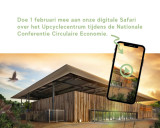
Op maandag1 februari 2021 vindt de derde Nationale Conferentie Circulaire Economie plaats. Het Upcyclecentrum organiseert die dag een digitale #Safari waarin we bezoekers op tour nemen door ons gebouw! Wil jij de #BigThree van het Upcyclecentrum spotten? Meld je dan aan voor de tour via onderstaande link.
https://www.conferentie-ce.nl/
We hopen je graag maandag digitaal te zien, tot dan!
Aan de bar met Inge Oskam: circulaire economie

Bubbels zijn er om op te drinken, niet om in te blijven zitten. Pak daarom je drankje en snacks erbij en schuif dinsdagmiddag 2 februari aan de bar met Inge Oskam. Onze digitale barman Luuk vraagt Inge het hemd van het lijf over circulaire economie. Wat is dat eigenlijk en wat moeten we ermee?
Inge Oskam
Dr Ir Inge Oskam geeft leiding aan de onderzoeksgroep Circulair Ontwerpen en Ondernemen. Samen met bedrijven, publieke organisaties, kennisinstellingen en studenten onderzoekt het lectoraat nieuwe manieren van ontwerpen, produceren en ondernemen, waarmee afgedankte producten en materialen kunnen worden omgezet in waardevolle toepassingen, ook wel repurpose genoemd.
Aanmelden
Het gesprek zal plaatsvinden via ZOOM en is gratis. Iedereen is welkom:
https://uva-live.zoom.us/j/82893491235
GO!-NH Versnellingsprogramma's - inschrijven voor 9 februari

GO!-NH is een serie groeiversnelling programma’s (accelerators) van de provincie Noord-Holland. Deze zijn opgesteld de economie in Noord-Holland te stimuleren met focus op de sectoren: bouw, beton, chemie, fashion, agri & food, verpakkingsmateriaal, handel en horeca. De thema’s voor de ontwikkeling van de circulaire economie in Noord-Holland zijn:
- Energietransitie
- Duurzame Mobiliteit
- Agri-food
- Circulaire Economie; Afval als Grondstof; Modulair ontwerp; Plastics; Textiel
Deze speciaal ontwikkelde programma’s ondersteunen startups en MKB’ers bij het op de markt brengen en opschalen van innovatieve producten en diensten op het gebied van duurzaamheid. Met trainingen, tools en professionele coaching door experts ontwikkel je jouw bedrijf.
GO!-NH heeft drie verschillende trajecten samengesteld, zodat ondernemers de beste ondersteuning krijgen die past bij de fase en omvang waarin hun bedrijf zich bevindt. Daarnaast vormt de GO!-NH Academy een laagdrempelige ontmoeting met GO!-NH waarbij masterclasses ook los gevolgd kunnen worden.
Masterclass: Hoe bepaal je de impact van jouw circulaire initiatief?

Ben je als ondernemer, docent of student bezig met een lokaal circulair initiatief en wil je een beeld krijgen van de (duurzaamheids)impact ervan? Doe dan mee met de online masterclass van de Hogeschool van Amsterdam (HvA) op 4 of 11 februari. Tijdens de interactieve webinar helpen HvA-onderzoekers Krispijn Faddegon (psychologie/ sociologie) en Maarten Mulder (circulair ontwerpen) om jouw initiatief verder te brengen.
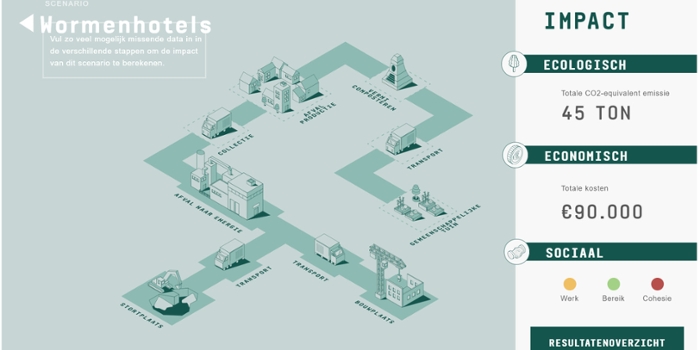
Wereldwijd dreigen grondstoffen op te raken die belangrijk zijn voor onze manier van leven. Daarmee overschrijden we de grenzen van wat de aarde ons kan bieden. Door circulair met deze grondstoffen om te gaan, kunnen we deze trend keren. Hoe zorgen we ervoor dat we in 2030 al 50% minder primaire grondstoffen gebruiken?
CIRCULAIR ONDERNEMEN
Circulair ondernemen wordt door overheden gestimuleerd en ook op lokaal niveau neemt het aantal circulaire initiatieven toe. Denk aan wormenhotels of het hergebruik van houten meubels en textiel. Het kan echter lastig zijn om te bepalen wat de effecten ervan zijn, zoals de CO2-uitstoot of extra arbeid. Hoe weet je of het op een bepaalde manier hergebruiken van materialen ook daadwerkelijk bijdraagt aan een betere wereld? Of op kleinere schaal: een betere stad of buurt?
HVA MASTERCLASS
Om daar een inschatting van te kunnen maken, biedt de HvA een masterclass aan: Hoe bepaal je de impact van een lokaal circulair initiatief? In de masterclass bekijken we een initiatief vanuit drie duurzaamheidspijlers:
- ecologische impact, zoals CO2-emissies;
- economische impact, waaronder kosten en eventuele opbrengsten;
- sociale impact, zoals sociale cohesie of educatie.
‘Tijdens deze online masterclass gaan we specifiek in op jullie eigen initiatieven en vragen’, vertelt onderzoeker Mulder (HvA). ‘Daarnaast bieden we voorbeelden rondom het hergebruik van hout en GFE-afval. Hiervoor gebruiken we onder andere onze ontwikkelde Re-Store-tool, waarmee de ecologische, economische en sociale impact ingeschat kunnen worden voor GFE-initiatieven.’
METEN VAN IMPACT
Het meten van impact rondom circulaire initiatieven is een vakgebied in ontwikkeling, waarbij discussie en vragen vanzelfsprekend zijn. De masterclass biedt een raamwerk om vanuit meerdere invalshoeken naar circulaire initiatieven te kijken en helpt je ontdekken op welke indicatoren je moet letten en hoe je die kunt meten. Doe en denk mee en laat je inspireren door lokale circulaire initiatieven.
INFO MASTERCLASS
4 februari, 15.00-17.00 uur - Voornamelijk voor medewerkers HvA
11 februari, 15.00-17.00 uur - Voornamelijk voor externen
52 weken duurzaam, we gaan het gewoon doen.
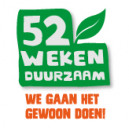
52wekenduurzaam nodigt je uit om je eigen leven stap voor stap duurzamer te maken. Een jaar lang iedere week een kleine verrassende en duurzame stap. Om te zien of het bij je past. Word je er gelukkig van, dan hou je het vol. Zo niet, dan skip je het. Wij onderzoeken wat er wel kan. Uitdagend, leuk, leerzaam en gratis. Loop je een stukje met ons mee?
Wij denken dat we met elkaar op een gemakkelijke manier veel duurzamer kunnen worden. Door elkaar te inspireren en uit te dagen. Door leuke en verrassende dingen te onderzoeken. Om zo je eigen versie van een duurzame leefstijl te ontwikkelen. We streven naar 5000 deelnemers in 2021. Hoe meer mensen meedoen, hoe beter. Voor onze Totale Impact Score, maar ook voor jezelf, want samen is veel leuker dan alleen. Dus geweldig als je nu al je gezin, je buren, vrienden en collega’s inspireert om ook mee te doen.
Placemaking Week India 2021

Calling environmental scientists, heritage conservationists, place brandologists, local administrators, urban designers, architects and citizen intermediaries to engage with Placemaking India in the run-up to its annual meeting.
We at #PlacemakingIndia are planning a moveable feast of beachfront, backwaters, riverbank and lakeside encounters in and around Mangaluru on the southwest coast of India in early December 2021.
Join us on the shores of the Arabian Sea in our India-wide mission to shake up spaces into #loveableplaces. Signal your interest to info@thesmartcitizen.org
#placemaking #communalspaces #heritagebuildings #culturaltourism #watersideplacemaking #urbanplanning
100,000 companies residual waste-free by 2025
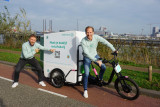
Scroll down for the English version
Seenons zamelt met datagedreven logistiek stromen gescheiden in
De circulaire economie wordt het nieuwe normaal. En data zijn de zuurstof van dat nieuwe normaal. In de Metropool Amsterdam werken tal van organisaties al hard aan circulaire initiatieven waarbij data een belangrijke rol speelt. Zo ook Seenons, dat bedrijven helpt bij duurzame afvalscheiding en -inzameling. ‘Wij willen de weeffouten uit het systeem halen.’
Echt eigentijds is de huidige afvaldienstverlening voor bedrijven niet. Grote wagens rijden op door hen bepaalde tijdstippen door onze straten. Het merendeel van het afval wordt verbrand. En los van papier en glas is het vrij ingewikkeld om aparte afvalstromen in te zamelen en op te laten halen. ‘Ik viel van de ene in de andere verbazing toen ik me in deze wereld ging verdiepen’, vertelt Jorn Eiting van Liempt, eigenaar van Seenons. ‘“Hier moet iets veranderen”, dacht ik. Ooit was afvalverbranding misschien een goed alternatief, nu kunnen we echt beter.’
Samen met Joost Kamermans startte Eiting van Liempt in september 2019 Seenons, een bedrijf dat wil bijdragen aan de circulaire economie door de afvaldienstverlening te verbeteren. Ze ontmoetten elkaar in de Amsterdamse startup-gemeenschap. Kamermans: ‘Als we in 2050 100 procent circulair willen zijn, dan moeten we iets doen, zo dachten we. We moeten ervoor zorgen dat onze grondstoffen straks eindeloos kunnen rondgaan in ons systeem. Dus daar proberen we aan bij te dragen. Het is onze ambitie dat er in 2025 100.000 bedrijven restafvalvrij zijn.’
Afvalstromen managen
Seenons helpt bedrijven om afvalstromen gescheiden in te zamelen. Het is een digitaal platform waarop bedrijven hun eigen afval kunnen managen. Ze krijgen inzicht in hun stromen en de waarde ervan, ze kiezen welke stromen zij apart willen laten ophalen en betalen daarvoor. Seenons regelt vervolgens de logistiek. Soms nemen pakketbezorgers de gescheiden afvalstromen mee, soms wordt het afval door een elektrische bakfiets opgehaald of door een traditionele afvaldienstverlener. Zelf heeft Seenons ‘geen wielen’, legt Eiting van Liempt uit. ‘Wij verbinden partijen aan elkaar: zo werken we met pakketbezorgers, maar ook met de sociale dienst: mensen die voor de plantsoenendienst door de stad rijden halen soms ook bij bedrijven reststromen op.’
Hun bedrijf is naar eigen zeggen de ontbrekende schakel tussen de data en de daadwerkelijke uitvoering. Kamermans: ‘Wij zagen dat veel startups in de circulaire economie zich vooral richten op data, op het in kaart brengen van afvalstromen. Maar daarmee breng je nog geen sinaasappelschillen van Schiphol naar Brabant. Vandaar dat wij ons ook zijn gaan focussen op de logistiek.’
Kamermans en Eiting van Liempt werken volgens de lean-startupmethode. Kamermans: ‘We hebben dus eerst de markt gescand en veel mensen gesproken over hun afvaluitdagingen. Op basis daarvan bedachten we dit platform en gingen we op zoek naar klanten. Binnen no-time hadden we vijftig aanmeldingen: van restaurants tot voetbalverenigingen en een infrastructuurbedrijf. Toen moesten we aan de bak en zijn we het product gaan bouwen.’
Pulp en koffiedrab
Zo’n 150 organisaties maken nu gebruik van Seenons. Bij het ene bedrijf zorgt Seenons ervoor dat alleen de koffiedrab wordt opgehaald, bij het andere bedrijf zijn het sinaasappelschillen — daar zit waardevolle olie in — en bij weer een ander bedrijf zijn het vooral elektronische apparaten.
Eiting van Liempt: ‘Bedrijven denken er vaak heel moeilijk over, maar het is gewoon een kwestie van beginnen. Je begint met een of twee stromen gescheiden inzamelen en breidt dat langzaam uit. Kijk naar Yoghurt Barn, een klant van ons: zij hebben binnen twee weken hun restafval met 82 procent kunnen verminderen. Zelfs de kiwischillen die overblijven na het maken van fruitshakes zijn nog bruikbaar: deze zamelen we gescheiden in om er siroop van te maken, wat Yoghurt Barn weer kan verkopen in hun winkel.’
In samenwerking met de KNVB helpt Seenons ook voetbalclubs. Daar worden blik en petflesjes apart ingezameld, wat die clubs geld oplevert. Ook deed Seenons een geslaagde pilot met Dijkstra Plastics, het bedrijf dat de emmers voor sauzen van Remia produceert. Daarbij haalden pakketbezorgers bij snackbars lege mayonaise-emmers op. ‘Wij zagen in onze data van snackbars dat deze emmers met het restafval meegingen en hebben toen contact gezocht met Dijkstra Plastics’, zegt Kamermans. ‘De pilot liet zien dat je die emmers gescheiden kunt ophalen, maar dat het tegelijkertijd ook complex is om zo’n systeem te veranderen. Je kunt die emmers bijvoorbeeld niet zomaar opnieuw gebruiken voor saus, daar zijn allerlei regels voor. Als tussenoplossing gaat Dijkstra deze emmers nu verwerken tot verfemmers.’
Wetten in de weg
Hoewel ze dus een voorspoedige start kennen, zijn er ook uitdagingen. Vooral de huidige regelgeving ervaren de ondernemers als een belemmering. Bijvoorbeeld dat het in veel gevallen nog goedkoper is om bepaalde stromen met het restafval weg te gooien. En dat er geen financiële prikkel is die het gebruik van gerecyclede materialen interessanter maakt dan het gebruiken van virgin-materialen.
En dan is er natuurlijk ook nog de coronacrisis. Horeca en sportverenigingen waren de grootste klantgroep van Seenons, maar hun activiteiten liggen nu grotendeels stil. Gelukkig hebben zich andere grote partijen gemeld: reguliere klanten, maar ook financiële instellingen. Die hebben interesse in de datagedreven afvalprofielen die Seenons opstelt. Kamermans: ‘Bedrijven die een lening nodig hebben kunnen met dat profiel hun duurzaamheidsambities aantonen. Dat is voor die dienstverleners waardevolle informatie en voor ons een interessante nieuwe markt die we aan het ontdekken zijn. Dankzij de data.’
Om hun ambities waar te maken zijn Kamermans en Eiting van Liempt op zoek naar een investeerder die hen kan helpen om door te pakken. Hun tip aan andere bedrijven die circulaire businessplannen hebben? ‘Vraag je altijd af of je idee ook zou aanslaan als duurzaamheid geen rol zou spelen. Natuurlijk, voor potentiële klanten is circulariteit interessant: maar je moet er ook voor zorgen dat je iets aanbiedt dat tegelijkertijd ook beter, eenvoudiger en/of goedkoper is dan iets dat al bestaat.’
Deze artikelenreeks is een initiatief van Hogeschool van Amsterdam | Gemeente Amsterdam | Amsterdam Economic Board | Amsterdam Smart City | Metabolic en AMS Institute. Samen willen zij de circulaire economie in de Metropoolregio Amsterdam versnellen met praktische verhalen voor en over ondernemers en bedrijven.
Lees verder
Volop kansen in de nieuwe circulaire werkelijkheid
Slim datagebruik in de circulaire economie: de drie belangrijkste redenen
_____________________________________________________
100,000 companies residual waste-free by 2025
Seenons uses data-driven logistics to collect waste streams separately
The circular economy is becoming the new normal, and data is propelling it. In the Amsterdam Metropolitan Area, numerous organisations are already hard at work on circular initiatives that prioritise the application of data. Among them is Seenons, which helps businesses manage their sustainable waste separation and collection. ‘We want to fix the flaws in the system.’
Waste disposal services for businesses have not exactly kept up with the times. Big bin lorries drive through the streets at certain times of day. Most of the waste is incinerated. And paper and glass aside, it’s quite complicated to separate waste streams and have them collected. ‘I got one surprise after another when I began delving into this world,’ says owner of Seenons Jorn Eiting van Liempt. ‘“Something has got to change here,” I thought. Waste incineration once might have been a good option, but now we really can do better.’
In September 2019, together with Joost Kamermans, Eiting van Liempt founded Seenons, a company aimed at contributing to the circular economy by improving waste services. The two co-founders met in the Amsterdam start-up community. ‘We realized that if we want to be 100 per cent circular by 2050, then we would have to do something about it,’ Kamermans says. ‘We would need to enable our raw materials to circulate endlessly in the system. So this is where we are trying to make a contribution. Our goal is for 100,000 companies to be residual waste-free by 2025.’
Managing waste streams
Seenons helps businesses get their waste streams collected separately. The Seenons digital platform lets companies manage their own waste. It provides insights into the waste streams and their worth, which helps them choose which streams to have collected separately and pay for it. Seenons then arranges the logistics. The separated waste might be picked up by a parcel deliverer, an electric cargo bike or a traditional waste service provider. Seenons has no wheels of its own, Eiting van Liempt explains. ‘We connect the parties. We work with parcel deliverers, but also with the municipal services, as the people who drive around the city doing parks service sometimes also collect waste from companies.’
Seenons is the missing link between the data and the actual implementation, Kamermans says. ‘We saw that a lot of start-ups in the circular economy mainly focus on data, on mapping waste streams. But that doesn’t actually get discarded orange peels from Schiphol to Brabant. This is why we also focus on logistics.’
Kamermans and Eiting van Liempt apply the lean start-up methodology in their work. ‘We first scanned the market and talked to a lot of people about their waste challenges,’ says Kamermans. ‘From there, we came up with this platform and started looking for customers. In no time, we had 50 customers signed up, from restaurants to football clubs, and we had an infrastructure company on-board. Then we had to get to work on building the product.’
Pulp and coffee grounds
Around 150 organisations now use Seenons. For one company, Seenons might arrange the collection of coffee grounds, for another it might be orange peels – which contains valuable oil – and for another it might be mainly electronic devices.
‘Companies often assume it has to be very hard, but it’s just a matter of getting started,’ says Eiting van Liempt. ‘You begin with one or two separate collection streams and expand slowly. Take our client Yoghurt Barn: they were able to reduce their residual waste by 82 per cent within two weeks. Even the kiwi skins left over from making fruit shakes are still usable: we collect them separately to make syrup, which Yoghurt Barn can then sell in their shops.’
In collaboration with the Royal Dutch Football Association, Seenons also helps football clubs. The clubs have their cans and PET bottles collected separately, which generates money. Seenons also ran a successful pilot with Dijkstra Plastics, the company that produces the containers for Remia sauces. Parcel deliverers pick up the empty mayonnaise containers from snack bars. ‘We saw in our data from snack bars that these containers were being disposed as residual waste, and then we contacted Dijkstra Plastics,’ says Kamermans. ‘The pilot showed that you can collect the containers separately, but at the same time, it’s complex to change a system like this. You can’t just reuse the containers for sauce, as there are all sorts of rules about that. As an interim solution, Dijkstra is now going to process the containers into paint buckets.’
Regulations in the way
Although Seenons is off to a good start, there are also challenges. The co-founders find current regulations to be particularly constraining. For example, it is often less costly to dispose some streams along with the residual waste. Moreover, no financial incentive makes it more economical to use recycled materials than virgin ones.
And then of course the corona crisis is an issue. Cafés, restaurants and sports clubs were Seenons’ biggest group of customers, but their activities have now largely come to a standstill. Fortunately, sign-ups have come from other organisations, not only the usual customers, but also financial institutions interested in the data-driven waste profiles that Seenons creates. ‘Companies that need a loan can use this profile to demonstrate their ambitions for sustainability,’ Kamermans says. ‘This is valuable information for these service providers. For us, it’s an interesting new market to discover. All thanks to data.’
To realise their goals, Kamermans and Eiting van Liempt are seeking an investor who can help them to push ahead. Their advice to other businesses with circular business plans? ‘Always ask yourself whether your idea would also work if sustainability didn’t play a role. Of course, circularity appeals to potential customers, but you also have to ensure that what you’re offering is better, simpler and/or cheaper than something that already exists.’
This article is an initiative by Amsterdam University of Applied Sciences | City of Amsterdam | Amsterdam Economic Board | Amsterdam Smart City | Metabolic | AMS Institute. Together we are working to accelerate the circular economy in the Amsterdam Metropolitan Area, sharing practical stories for and about entrepreneurs and businesses.
Read more
A wealth of opportunities in the new circular reality
Smart data usage in the circular economy: 3 key reasons
Communication Alliance for a Circular Region (CACR)

De taskforce Communication Alliance for a Circular Region (CACR) wil de circulaire economie in de Metropoolregio Amsterdam versnellen met praktische verhalen voor en over ondernemers en bedrijven. We nodigen iedereen uit mee te doen met de discussie op amsterdamsmartcity.com. De CACR bestaat uit: Hogeschool van Amsterdam | Gemeente Amsterdam | Amsterdam Economic Board | Amsterdam Smart City | Metabolic en AMS Institute.
Artikelen 'Circulaire economie en data'
• Volop kansen in de nieuwe circulaire werkelijkheid / Data zijn de zuurstof van de circulaire economie: deel 1
• Slim datagebruik in de circulaire economie: de drie belangrijkste redenen / Data zijn de zuurstof van de circulaire economie: deel 2
• 100.000 bedrijven restafvalvrij in 2025
• Slim datagebruik in de circulaire economie: dit is wat bedrijven zelf kunnen doen / Data zijn de zuurstof van de circulaire economie: deel 3
Artikelen circular strategies
Maak je bedrijf toekomstbestendig met deze circulaire strategieën
--------------------------------------------------------------------------------
The taskforce Communication Alliance for a Circular Region (CACR) is working to accelerate the circular economy in the Amsterdam Metropolitan Area, sharing practical stories for and about entrepreneurs and businesses. The CACR is an initiative by Amsterdam University of Applied Sciences | City of Amsterdam | Amsterdam Economic Board | Amsterdam Smart City | Metabolic | AMS Institute.
Articles 'Circular economy and data'
• A wealth of opportunities in the new circular reality / Data is the oxygen that the circular economy thrives on: part 1
• Smart data usage in the circular economy: 3 key reasons / Data is the oxygen that the circular economy thrives on: part 2
• 100,000 companies residual waste-free by 2025
• Smart data use in the circular economy: this is what companies can do themselves / Data is the oxygen that the circular economy thrives on: part 3
Articles: Future-proof your business using circular strategies
Wicked Problems
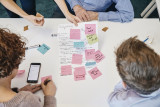
Te wicked? Niet voor ons.
Wij werken allemaal aan urgente, complexe, maatschappelijke uitdagingen. Issues die schier onoplosbaar lijken, van dilemma’s en paradoxen omgeven, nog niet duidelijk hoe het moet. Wel is duidelijk dát het moet, dat we elkaar nodig
hebben en dat we er NU aan moeten beginnen. Om met de woorden van Jan Rotmans te spreken; we leven niet in een tijdperk van verandering maar in een verandering van tijdperk. En hier hoort een nieuwe gereedschapskist bij.
En of je nou aan energietransitie werkt, andere mobiliteitssystemen, creëren van waterstofhubs, peer to peer autodeelsystemen, het maakt niet uit, we zien dat al deze opgaven op enig moment tegen gelijksoortige barrières aanlopen. Op samenwerking, financiering, privacy, onvoldoende aansluiting op de maatschappij, om maar een paar voorbeelden te noemen.
Unieke samenwerking
Als Amsterdam Smart City netwerk willen en kunnen we deze opgaven niet laten liggen. Door het bundelen van onze kennis en expertise kunnen we als netwerk iets unieks bieden en de wil en durf tonen om deze barrières te doorbreken. De betrokken partners die dit uitdenken en begeleiden zijn RHDHV, Kennisland, Drift, NEMO, Arcadis, Alliander, HvA en Metabolic. Zij bundelen hun expertise en ervaring om de echte vragen boven tafel te krijgen, tot nieuwe manieren van samenwerken te komen en barrières te doorbreken. We richten ons met name op de start van de samenwerking. Gezamenlijk ontwikkelen we een ‘wicked problem aanpak’. Op een nieuwe manier, lerend door te doen, exploratief.
Waar moet je aan denken?
Wat is eigenlijk het echte probleem? Wiens probleem is dit? Hoe kijken anderen er tegenaan? Welke andere partijen lijken nodig? Hoe vind je ze? Hoe ga je om met eigenaarschap en botsende frames? Hoe zorg je dat je al in
een vroeg stadium de maatschappij (bewoners, ondernemers, werknemers, etc) betrekt en hun ervaringen in het project trekt? Het wicked problem team zet nieuwe methoden in voor het beantwoorden van deze vragen. En het creëren van de benodigde commitment om het vraagstuk aan te pakken. Niets staat van te voren vast, want we passen ons aan aan wat we tegenkomen. Met elkaar ontwikkelen we een nieuwe aanpak om de barrières te doorbreken.
Upcyclecentrum Almere

In the Upcyclecentrum we make the circular economy and the upcycle process visible and tangible. We don’t do this alone. Our residents provide us with raw materials by properly separating their waste, the entrepreneurs (startups) upcycle these raw materials into new products and inspiring workshops are organized in our circular designed experience center. Waste = raw material in the circular economy; this is the central theme of all our activities.
Follow us on instagram on www.instagram.com/upcyclecentrum
#upcyclecentrum
3-CYCLE
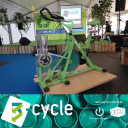
We are 3-CYCLE, a new upcycling project by Erik Fakkeldij (The Botfactory) and Joost Bosker (Oerz). We joint forces in 2019 to create new products from used pieces of plastics and metal. And... to make this a true dutch innovation, we use a setup with a bike to do the first steps of the upcycling process!
But that's not all... we do this by giving workshops and presentations to kids and the public to create more awareness. Our aim is to show that waste is not only bad for the environment, but it also means missed opportunities for reusing the waste and upcycling it into new products.
We believe this type of education is key for engaging the public, while making a
difference at the same time.
Circulair ondernemen, doe je samen

In de transitie naar een circulaire economie worden ondernemers steeds meer gevraagd na te denken over onze keten en hoe we inkopen. Hoe transparant moet je zijn naar je klanten? Wat mag je verwachten van je leveranciers? Hoe denk je in oplossingen in plaats van problemen? Je wilt wel innovatief zijn, maar hoe en wie gaat dat betalen?
Om ondernemers te helpen bij deze vraagstukken, organiseren we deze circulaire meetup dat volledig in het teken staat van samenwerking in de circulaire economie. De meetup wordt geopend door expert Erick Wuestman die zijn inzichten deelt over het belang van samenwerking om uitdagingen in een circulaire economie aan te gaan en de transitie te versnellen.
In de transitie naar een circulaire economie worden ondernemers steeds meer gevraagd na te denken over onze keten en hoe we inkopen. Hoe transparant moet je zijn naar je klanten? Wat mag je verwachten van je leveranciers? Hoe denk je in oplossingen in plaats van problemen? Je wilt wel innovatief zijn, maar hoe en wie gaat dat betalen?
Om ondernemers te helpen bij deze vraagstukken, organiseren we deze circulaire meetup dat volledig in het teken staat van samenwerking in de circulaire economie. De meetup wordt geopend door expert Erick Wuestman die zijn inzichten deelt over het belang van samenwerking om uitdagingen in een circulaire economie aan te gaan en de transitie te versnellen.
Voor wie? ondernemers en meedenkers!
Ondernemers | Tijdens dit event krijg je als ondernemer de kans om een eigen casus in te brengen waaraan gezamenlijk wordt gewerkt. Casussen op het gebied van circulair ondernemen staan centraal, daarbij valt te denken aan de volgende uitdagingen:
- Circulair ondernemen in de voedingsindustrie
- Circulaire plastics
- Circulair ondernemen in de textielindustrie
- Circulaire businessmodellen
Meld jouw casus gratis aan via het aanmeldformulier.
Meedenkers | Wil je graag meedenken met uitdagende casussen op het gebied van circulair ondernemen, vanuit jouw praktijkervaring, expertise, opleiding of interesse? We nodigen circulaire ondernemers, beleidsmakers, circulaire experts en andere circulaire initiatiefnemers uit om mee te denken!
Meld je gratis aan via deze Eventbrite pagina.
Datum
Het event vindt online plaats op 25 juni van 15.00 uur tot 17.00 uur.
Programma
15:00 - 15:15 Welkom
15:15 - 15:45 Spreker Erick Wuestman, over het belang van samenwerken voor een circulaire economie en de rol van circulair inkopen.
15:45 - 16:30 Crowdsolve your challenge
16:30 - 16:45 Afsluiting en vervolgstappen
Doe mee en werk samen!
- Ontmoet collega-ondernemers en experts op het gebied van circulariteit in de Provincie Noord-Holland
- Krijg waardevolle input vanuit verschillende invalshoeken voor je eigen vraagstukken en/of help (andere) ondernemers met jouw expertise.
- Krijg concrete tools om circulariteit te versterken in jouw bedrijf en pas het toe na de meetup.
- Maak impact en werk aan zaken waar je echt omgeeft.
Circulair Ecosysteem
Dit event is georganiseerd door Impact Hub Amsterdam en de provincie van Noord-Holland. De provincie Noord-Holland en Impact Hub Amsterdam werken samen om circulaire ondernemers met elkaar in contact te brengen om de transitie naar een volledig circulaire economie in 2050 te versnellen.
Amsterdam launches next stage of circular economy programme
Amsterdam will launch the fourth stage of its circular economy initiative next week, with 200 new projects planned for the coming year. Its 2020-2025 strategy, set to be published 8 April, will build on last year’s programme that saw 116 projects implemented.
Introduction meeting GO!-NH Accelerator Sustainable Innovation 2020

Introduction meeting GO!-NH Accelerator Sustainable Innovation 2020
With the help of these introduction meetings, you will get to experience the program and learn from participating teams about what the previous programs brought them.
February 10th 2020 - IDEA, Alkmaar - 15:30 - 18:00
Apply through Eventbrite: https://gonh2020-11feb.eventbrite.nl
ABOUT GO!-NH
The GO!-NH Accelerator puts SMEs and start-ups on the fast track to development. New ways of thinking, new skills and new partners are a must. This programme is all about circular economy, targeting sta-ups, innovative SMEs, large organisations and institutions. GO!-NH brings together all the relevant parties to activate, connect and develop this sustainable innovation ecosystem.
In a three-month programme you’ll go from concept to a business offering innovative solutions that’s ready to take the market by storm. Training sessions, tools and professional support from expert practitioners will help you in developing your business in a sheltered environment. The progress you make during these few months would normally take a full year. GO!-NH is a joint venture of the province of North Holland and Innomics.
The Accelerator program enables startups, innovative SMEs and innovation teams from large organizations to convert ideas into new business models in a short time and to accelerate customer and product development in order to shorten the time to market. You develop your business with training, tools and professional support from experts.
Introduction meeting GO!-NH Accelerator Sustainable Innovation 2020

Introduction meeting GO!-NH Accelerator Sustainable Innovation 2020
The GO!-NH Accelerator puts SMEs and start-ups on the fast track to development. New ways of thinking, new skills and new partners are a must. In a three-month programme you’ll go from concept to a business offering innovative solutions that’s ready to take the market by storm. Interested?
With the help of these introduction meetings, you will get to experience the program and learn from participating teams about what the previous programs brought them.
February 10th 2020 - IDEA, Alkmaar - 15:30 - 18:00
Apply through Eventbrite: https://gonh2020-10feb.eventbrite.nl
ABOUT GO!-NH
The GO!-NH Accelerator puts SMEs and start-ups on the fast track to development. New ways of thinking, new skills and new partners are a must. This programme is all about circular economy, targeting sta-ups, innovative SMEs, large organisations and institutions. GO!-NH brings together all the relevant parties to activate, connect and develop this sustainable innovation ecosystem.
In a three-month programme you’ll go from concept to a business offering innovative solutions that’s ready to take the market by storm. Training sessions, tools and professional support from expert practitioners will help you in developing your business in a sheltered environment. The progress you make during these few months would normally take a full year. GO!-NH is a joint venture of the province of North Holland and Innomics.
The Accelerator program enables startups, innovative SMEs and innovation teams from large organizations to convert ideas into new business models in a short time and to accelerate customer and product development in order to shorten the time to market. You develop your business with training, tools and professional support from experts.
Week of the Circular Economy #4: the Zwerfinator
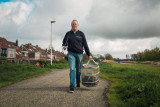
Throughout the week of the Circular Economy, we are shining a spotlight on inspiring sustainable initiatives in the Netherlands. Joining forces with startups, social entrepreneurs, creative professionals, leading companies, and forward thinking governments, to showcase what a circular economy can look like. Meet the pioneers, learn from them and get inspired! Next up is Dirk Groot. Profession: superhero - fighting litter and plastic soup with his Zwerfinator movement.
Throughout the week of the Circular Economy, we are shining a spotlight on inspiring sustainable initiatives in the Netherlands. Joining forces with startups, social entrepreneurs, creative professionals, leading companies, and forward thinking governments, to showcase what a circular economy can look like. Meet the pioneers, learn from them and get inspired! Next up is Dirk Groot. Profession: superhero - fighting litter and plastic soup with his Zwerfinator movement.
So, Dirk, can you tell us about the Zwerfinator?
My personal mission is the battle against litter. I do that by: i) cleaning up, ii) educating people & creating awareness; iii) and most importantly: conducting research. I conduct research by collecting data on litter: what is it, where did I find it and how does this match with the surroundings. Based on the collected data I advise local governments and companies and help them with finding solutions.
I am a data scientist by heart. So I know a lot about data: how to collect, interpret and advise on this data. I started 6 years ago with picking trash and 3.5 years ago with collecting the data.
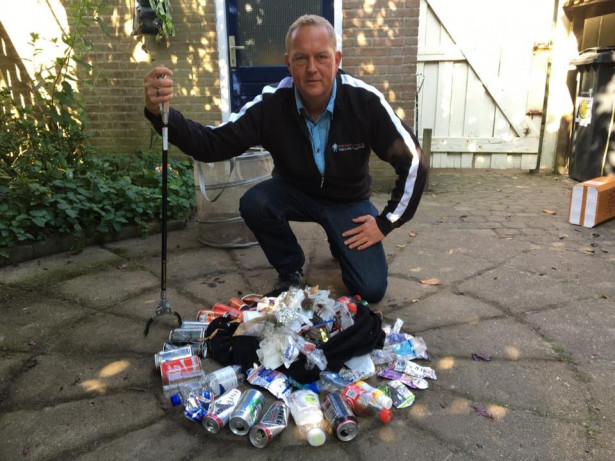
And how do you collect this data?
I use an app: Litterati. This app allows me to upload pictures of every piece of litter I pick up. Besides the picture I add extra data like: what it is, what kind of material, what kind of brand, the exact geo-location, and some extra details. You can see on the map where there is a lot of litter found and see if you can discover certain tracks. It is even possible to find the origin of the litter, for example, is there a company or store that produces a lot of litter? You can see this in the data collected. With this data I can signal to the company that they produce a lot of litter. Together we can try to find solutions like: reducing the amount of packaging or looking at the production of packages, is it possible to use organic materials.
But not only the places that have a lot of litter are valuable: it is also valuable to examine the really clean parts of the city.
How many people are collecting the data?
I see a shift: there is a growing number of people collecting data while picking up trash. I think people are fed up by picking up the same amount of trash, time after time, and they see the value of collecting the data for formulating solutions. It’s a new kind of volunteer work and the plus side is: you can do it anywhere, at any time. If you have an hour to spare, it is sunny, you can just go outside and contribute. In the Netherlands we have about 300 active users of the app, we have the most active members in the world. Worldwide there are about 4,700,000 pieces of litter picked up.
Can you give an example where the collected data made impact?
In June 2018, I started a campaign to create awareness about the commonly found litter, Antaflu wrappers. I encouraged other people to collect and tag these pieces of litter correctly. In total over 30,000 data points are collected now. With this information I teamed up with Merijn Tinga (the Plastic Soup Surfer) and we visited the CEO of Pervasco (the producer of Antaflu candy) in Rotterdam and he decided to change the packaging from plastic to paper, a more organic material.
After this successful campaign, we decided to start a second campaign to pass a policy that bans manufacture and sale of the Knetterbal Firecrackers. (also known as Crackling Balls) We started a movement that managed to pick up and tag over 50,000 littered plastic shells of these firecrackers in two months. After collecting and publishing this information, HEMA and the Albert Heijn decided to ban the sale of these firecrackers. This created a ripple effect inspiring 7 other retailers to remove Knetterbals from their shelves. Great to see that a campaign led to direct results.
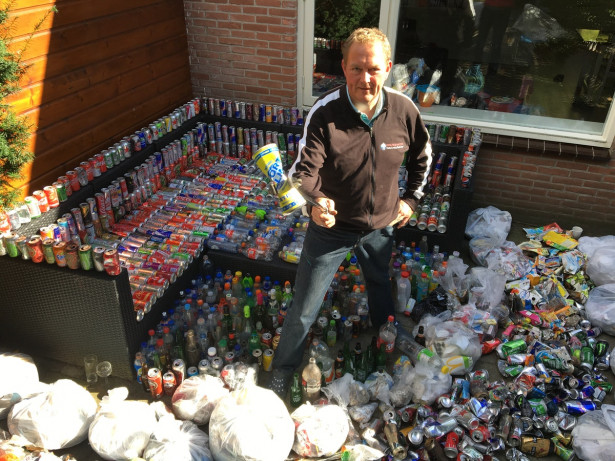
Looking at the future, what will be the next step? What do you need to make your impact even bigger?
I work according to the Forest Gump principle. Do you know what this is? This means that if I have an idea, I start to run with it, just like in the movie. I started alone with an idea to collect data surrounding litter. I talked to a bunch of people, but no one really believed that it could make impact. But I was convinced that it could make a difference. That’s why I just started and run with the idea. Now 3.5 years later the impact and results are tangible and people finally see and appreciate the added value.
Normally you see people having an idea and start looking for investors. For me it works the other way around: I have an idea or hunch and start with the implementation immediately. The rest will follow later.
But the campaigns I did together with Merijn are really successful and I like to do more of those in the future. We’re a good team. He is good in the lobbying and campaigning aspect and I can activate the community of litter pickers to collect the data. Next thing on the agenda is the ‘Plastic Avengers’ conference in Blue City, Rotterdam. Bringing all those individuals battling the plastic or litter problem together. So that they can collectively find concrete and tangible solutions for these challenges. For example in a Hackaton or something else.
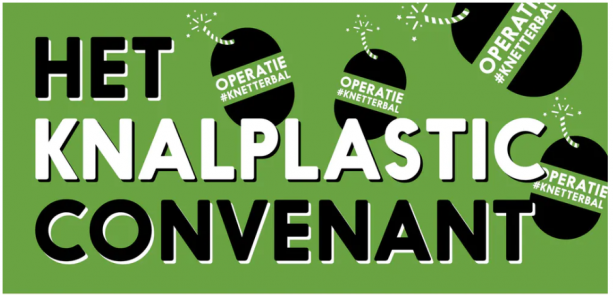
What do you think could be done in your industry to accelerate the transition to a circular economy?
I think there are three important things that I want to mention. First, there needs to be a deposit on all drinking packages. Even everything that has a lid or cap. No exceptions. And making sure it is made of recyclable material. There needs to be some sort of economic incentive for people to take recycling seriously. Second, circular economy can also exist in nature. Not everything has to be recycled for humans. It can also be recycled for nature or animals. Of course with the exception of synthetic materials. Third, we can learn a lot of how people used to live. During and after the war, people lived in scarcity. No food was wasted and what could be reused, was reused. For example, my parents owned a bakery and nothing was spilled: from old or broken pastries we made different, new products. If everyone will live by this mindset, the transition to a circular economy is possible.
-----------------------------------------------------------------------------------------------------------
This interview series is a collaborative initiative of Metabolic, AMS Institute, City of Amsterdam, the Amsterdam Economic Board and Amsterdam Smart City. Working together within the Amsterdam Smart City platform, these organisations are committed to accelerate the transition to a circular economy.
Week of the Circular Economy #1: Upcyclecentre Almere
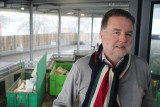
Throughout the week of the Circular Economy, we are shining a spotlight on inspiring sustainable initiatives in the Netherlands. Meet the pioneers, learn from them and get inspired! First up is Henk Martens: Programme Manager of the Upcyclecentre in Almere.
Throughout the week of the Circular Economy, we are shining a spotlight on inspiring sustainable initiatives in the Netherlands. Joining forces with startups, social entrepreneurs, creative professionals, leading companies, and forward thinking governments, to showcase what a circular economy can look like. Meet the pioneers, learn from them and get inspired! First up is Henk Martens: Programme Manager of the Upcyclecentre in Almere.
So, Henk, can you tell us what the Upcyclecentre is all about?
The Upcyclecentre contributes to a circular economy in which raw materials are reused optimally. Residents bring in their waste, and startups on site design and create products from the waste. Old goods gain new economic value, value which in some cases may be higher than the original value. It’s a new concept; people may say it’s the first upcycle centre in Europe. Almere wants to show residents, companies, and other cities that it is possible. But it’s much more than this: the building itself is designed to be circular, with recycled materials. We have 276 solar panels on the roof, and we can collect and reuse rainwater for the toilets. And much more importantly we want to inspire visitors to think and act with a circular mindset. This year we even started offering an educational program for schools.
Every year Almere records 400.000 unique visitors at the waste points.
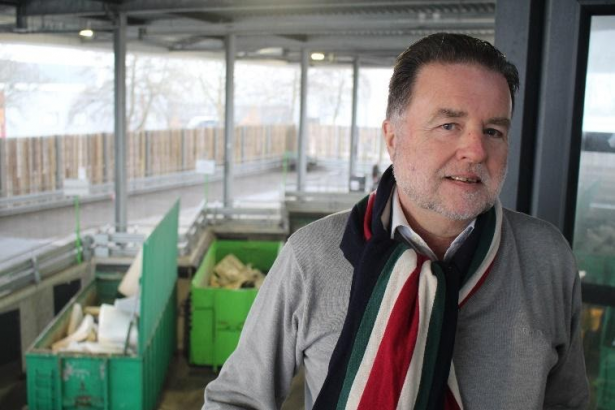
What kind of startups are on site?
We just had the first batch of startups. Ruig & Geroest makes interior designs, like lamps, from trash, Ruik makes perfume from pine needles or orange peels, & Seefd saves and screenprints pre-loved clothes. The Upcyclecentre gives these circular startups the chance to develop their business cases by offering them a workspace, giving them a small startup capital of €5.000, and helping them with collecting the right used materials. In exchange, the startups have to share the message of circularity and stimulate circular behavioral change by giving workshops to residents, children etc. Now we are looking for the second batch of startups: there is a time constraint on how long the startups can remain on site, to give the opportunity to other circular entrepreneurs, further accelerating the transition to a circular economy. It’s sort of like an incubator program. But the City of Almere still offers the opportunity to join a circular hub district.
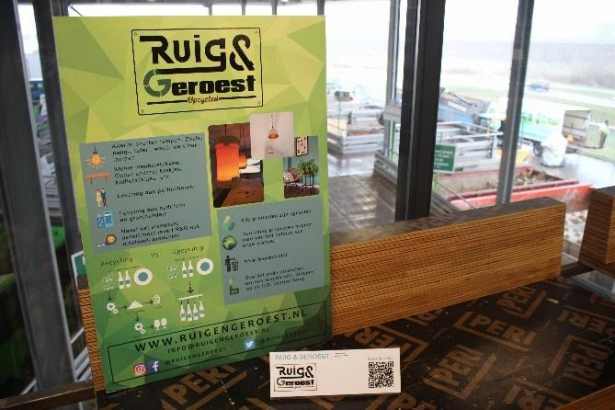
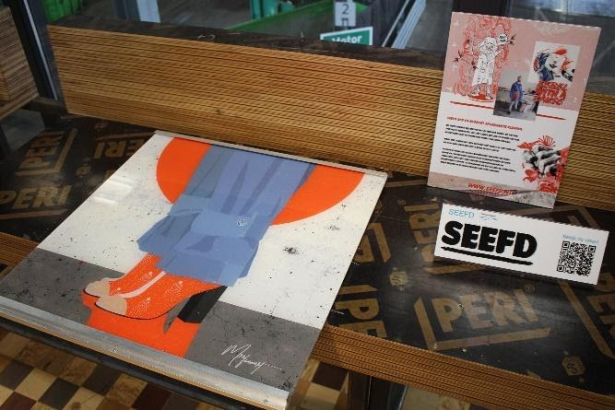
You briefly mentioned that this is the first Upcyclecentre of Europe. Why do you think this hasn’t happened before?
Coincidence or not, Almere is hosting the International Horticultural Expo in 2022: the Floriade. The theme is ‘Growing Green Cities’ and the expo will focus on the green city of the future with growing cities: in 2050 more than 70% of people will live in cities. This created a momentum to do things differently, develop this center and create a showcase for the Expo. It wasn’t easy and it is not something you can do by yourself. The City of Almere collaborated together with the Omgevingsdienst, the Province of Flevoland and the Ministry of Economics & Climate to make this idea into reality.
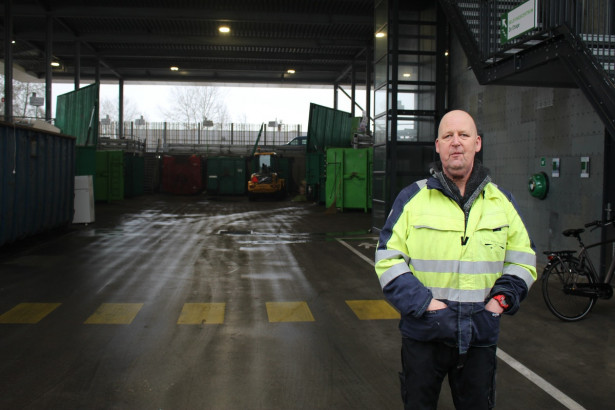
What do you think are the biggest barriers and challenges the Upcyclecentre is facing?
It’s a difficult question. We are really in the start-up phase. 2020 will be the year to prove that the Upcyclecentre has the right to exist and we will focus on measuring the impact we’ve created towards a circular economy. One challenge is the involvement of residents, even more. Or finding the right startups to join the incubator program on site.
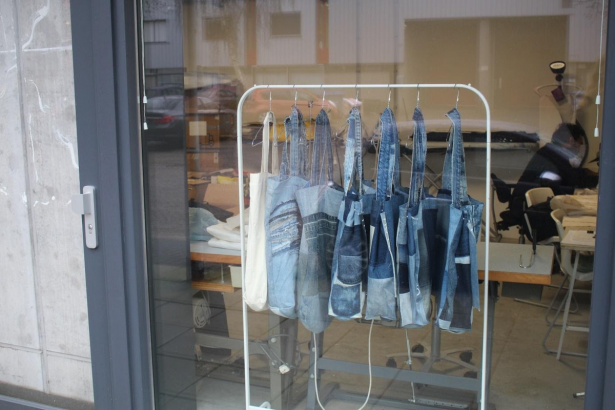
The City of Amsterdam organized a market exploration for a potential Upcyclecentre in Amsterdam North. Do you have any learnings or recommendations for them?
First of all, it is super important to start this initiative with a group of highly motivated people. People who are intrinsically motivated to make this a success. People who believe in the story and want to be an ambassador for the Center. Secondly don’t underestimate the power of good marketing and communication. You want to do this not only for, but also with, the residents of the city. You want to use this center to involve and inspire residents to make this transition to a circular economy happen. This means involving the residents from the start and also reducing potential barriers for users of the center. Make residents your ambassadors as well.
What do you think could be done in your industry to accelerate the transition to a circular economy?
It’s important to show the world that it is possible;a positive outlook on the circular economy. A can-do mentality. That’s what we want to accomplish with the Upcyclecentre. Set an example for the rest of the world and show something concrete and tangible. The city government can take a leading role in this as well. The City of Almere’s initiative is a good example for this.
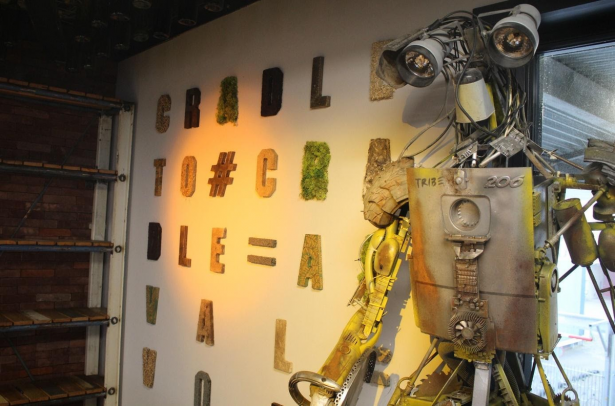
And if we are looking into the future, where is the Upcyclecentre in 5, 10 or maybe even 20 years?
In a dream scenario all stakeholders have a circular mindset: companies, government, educational organizations and residents. But it’s going to be difficult. The first step is relatively easy: mobilizing the frontrunners. The next step is going to be harder: mobilizing the masses. But with the arrival of the new Account Manager, Hede Razoky, the first step in the right direction is made!
-----------------------------------------------------------------------------------------------------------
This interview series is a collaborative initiative of Metabolic, AMS Institute, City of Amsterdam, the Amsterdam Economic Board and Amsterdam Smart City. Working together within the Amsterdam Smart City platform, these organisations are committed to accelerate the transition to a circular economy.
Week of the Circular Economy | Meet the pioneers, learn from them and get inspired!
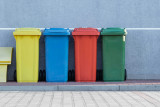
Throughout the week of the Circular Economy, we are shining a spotlight on inspiring sustainable initiatives in the Netherlands. Joining forces with startups, social entrepreneurs, creative professionals, leading companies, and forward thinking governments, to showcase what a circular economy can look like. Meet the pioneers, learn from them and get inspired!
Welcome to the Dutch week of the Circular Economy! Throughout the week, we will be shining a spotlight on inspiring sustainable initiatives in and around the Amsterdam area, by sharing interviews with pioneering projects and companies who are showing tangible solutions to take us from a linear to a circular economy.
Read about startups, social entrepreneurs, creative professionals, leading companies, and forward thinking governments, and learn what a circular economy can look like. We will be publishing 2 articles each day. So, stay tuned!
This interview series is a collaborative initiative of Metabolic, AMS Institute, City of Amsterdam, the Amsterdam Economic Board and Amsterdam Smart City. Working together within the Amsterdam Smart City platform, these organisations are committed to accelerate the transition to a circular economy.
More information about this week: https://deweekvandecirculaireeconomie.nl/
#circulareconomy #WeekvandeCE
Read all the interviews here:
#1 Upcyclecentre Almere
#2 Program Circular Mattrasses
#3 Building bridges from flushed toilet paper
#4 The Zwerfinator
#5 Getting buy-in for products-as-a-service
#6 Loop a.life
#7 Circular Textile Industry
#8 InStock
#9 ECO Coin
The Whole Package: Innovations in Food Packaging

Explore trends in sustainable food packaging, innovations & partnership opportunities at Impact Hub, with Futureproof.community.
About this Event:
How can we make food packaging sustainable? Plastic waste is a global problem, and the EU is preparing the transition towards a circular economy. Where does that leave food packaging? During this event, we will explore trends, innovations and opportunities, together with Futureproof.community by MVO Nederland.
For whom?
This evening is for innovation-seekers and makers. We will discuss success stories and do some live matchmaking, especially to make it easier for established companies and smaller innovative parties to find and talk to each other. You’ll meet and learn from entrepreneurs and innovators from our Food, Plastics, and Circularity Ecosystems and be able to start new collaborations.
Speakers
The warming up will be a panel interview, moderated by Caroli Buitenhuis of Green Serendipity, expert on bioplastics, circular economy and sustainable packaging. Chocolatemakers, Willicroft and People of Tomorrow will share their journey towards a sustainable package for their products.
Keynote speaker of this event will be Willemijn Peeters, founder of Searious Business, who helps (food) businesses to become plastic-free and circular. Her mission is to help transform our global economy and is an expert in bringing about organisational strategy & operational change.
Programme
19:00 Walk-in
19:30 Start
20:30 - 21:00 Matchmaking Drinks
About Futureproof.community:
You want to engage in more sustainable business, develop and move forward. For that, you need a product or service, knowledge or that one connection. Futureproof.community by MVO Nederland supports your search for the perfect match. For our 10.000 members, we already made over 4000 matches, so let us have a look at your entrepreneurial challenge! Do you want to know how it works? Watch this video.
About Impact Hub’s Food Ecosystem:
The Netherlands is the second largest exporter of agro-food products worldwide. What if we used this position to make real impact across the food chain and accelerate the transition to a more sustainable food system? Through our ecosystem approach, we bring together and strengthen relationships between entrepreneurs, investors, government, corporates and other organisations. Together we create innovation and resources for positive change in the food sector.
Stay up to date
Get notified about new updates, opportunities or events that match your interests.

